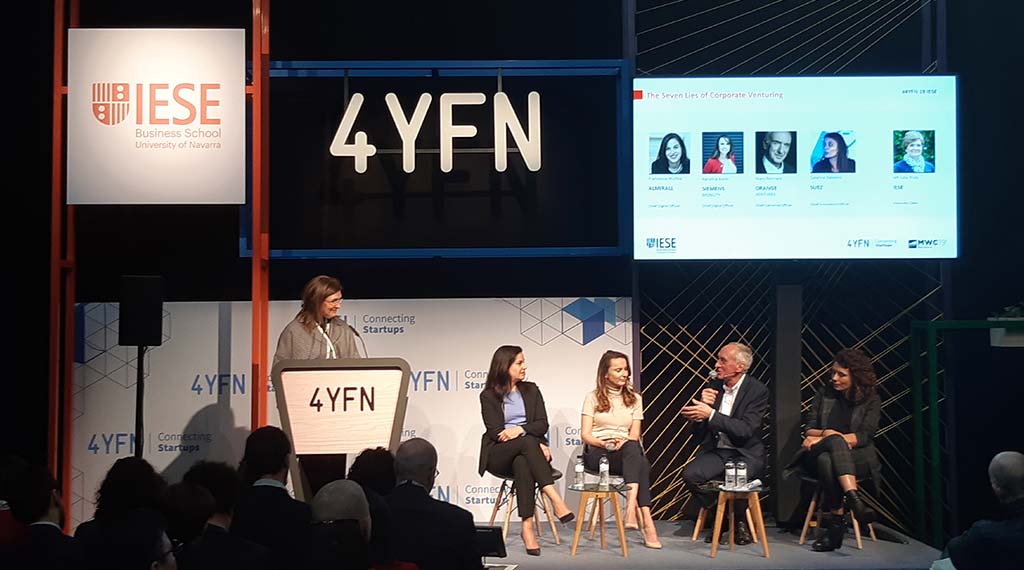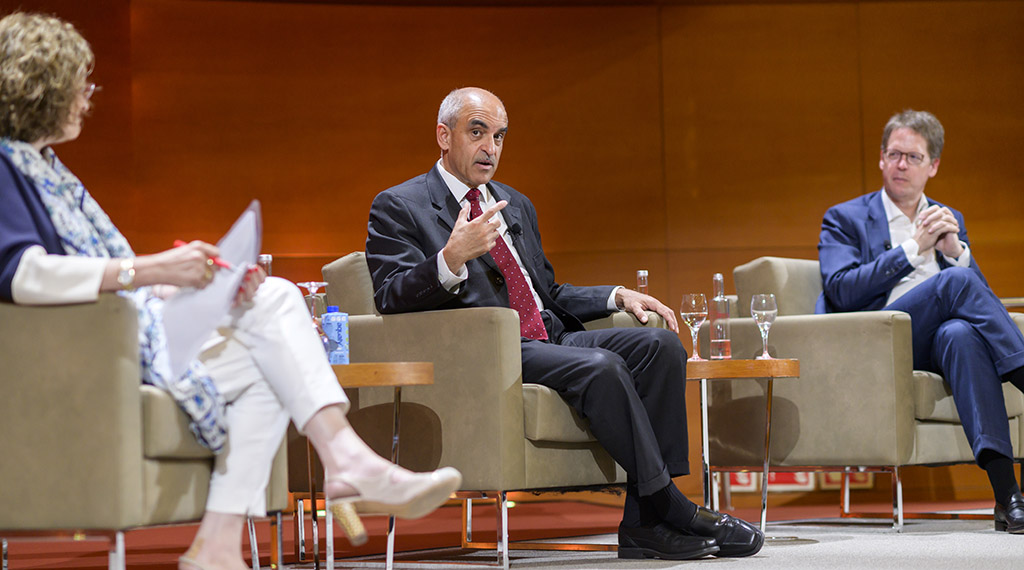Stories
When corporations and startups cross paths
At MWC 2019 startup event, IESE looks at the many faces of corporate venturing
February 26, 2019

What’s the best way for large corporations and startups to work together? Is there a single tool that’s better than all others? Once they team up, what happens next? And how do you measure whether the corporate venturing has been successful?
These were some of the issues discussed as IESE kicked off MWC 2019 in Barcelona with back-to-back sessions at 4YFN, the MWC-linked conference focused on startups. The sessions were moderated by professors Julia Prats and Thomas Klueter, and brought together executives from large corporations and startups – all intent on innovating, all with their own experiences on how to do this.
For Prats, it’s about “how large corporations can take advantage of the innovation that startups bring into the market, and at the same time how startups can learn from corporations.”
As the sessions made clear, there’s no cookie-cutter approach to that relationship. It can range from large companies becoming a startup’s biggest customer early on, to a corporate acquiring a majority of equity – and everything in between. Corporations offer deep pockets, scale, management and product expertise, and long-term commitment; startups offer fresh solutions to problems, along with agility.
“We are currently using a portfolio of mechanisms for how to work with startups,” said Karolina Korth, chief digital officer of Siemens Mobility Spain. “Depending on what the current problem is, there are many tools you can use in a corporate environment.”
Bill Gajda, global head of Strategic Partnerships and Innovations for VISA, agreed that each company must tailor its approach: “Different companies depending on where they fit in the ecosystem of their industry will bring a different perspective to venture.”
Are corporations better customers or owners?
For Gregor Gimmy, head of BMW Startup Garage, the best approach to startups is to simply become a major customer. “What does a startup need from a corporate and what does the corporate need from a startup? The startup needs the corporate to buy their product. What does BMW need? BMW needs solutions. They need technology.”
Adding a company with the clout of BMW to its client roster gives a startup revenue and credibility, while freeing it to work with many other customers, including BMW competitors; when large corporations go the route of equity stakes, competitors will likely avoid the startup.
But others take a different tack. Gajda said that when VISA makes equity investments, it seeks tight commercial agreements and input into the companies. “We can bring deep subject matter expertise if you’re looking for a product extension, or if you’re trying to validate something that you’ve built. We can also accelerate speed to commercialization,” said Gajda. “I think there’s a number of reasons related to a different skillset and a different mindset that corporates bring.”
Which is what some startups fear. Avi Meir, a founder of business website Travelperk, sold his previous venture to Booking.com. But so far he has raised funds from non-corporates, because he doesn’t want to sell the business and wants to stick to his strategic focus.
“Maybe I’m wrong, but the impression we entrepreneurs have is that once you are signing the first term sheet to raise a minority investment from a corporate VC, it’s the first step basically to selling the company to them,” Meir said.
But BP Ventures said that’s not always the case. “That’s not why we invest in companies. We invest in companies because they have technology that is disruptive … When we invest in a company we invest because we think it’s a company that can do well in the future,” said Ignacio Gímenez, investment director of BP Ventures.
And large corporations don’t always need to look outside to innovate. Catalina Balseiro, chief innovation officer of Suez, said her company also has a host of mechanisms to deal with entrepreneurs, but also foments intrapreneurship. “It’s very important to combine knowledge from outside and knowledge from inside.”
Rethinking the metrics
Whatever the agreement, at a certain point in the relationship there will be some sort of financial evaluation.
But the speakers said that it’s important to establish new metrics for investment in startups. “There has to be the right level of understanding from management, from the board of directors in order to enable digital experimentation,” said Francesca Wuttke, chief digital officer of Almirall. “There has to be several experiments done, most with the goal of scaling, but not all with the goal of directly impacting revenue.”
Even if there is positive financial return, it won’t be immediate. “In this industry you invest one day, and it’s only five to 10 years later that you make your exit and you prove that you’ve been successful,” said Marc Rennard, chief executive officer of Orange Digital Ventures. “It’s a good balance between financial results and strategic benefits for the group.”
Part of the return can be pushing along the cultural change that comes with dealing with startups, or intangible benefits such as attracting new profiles to work. “Making yourself friendlier to a startup requires a big change in how the corporation is working,” said Almirall’s Wuttke.


